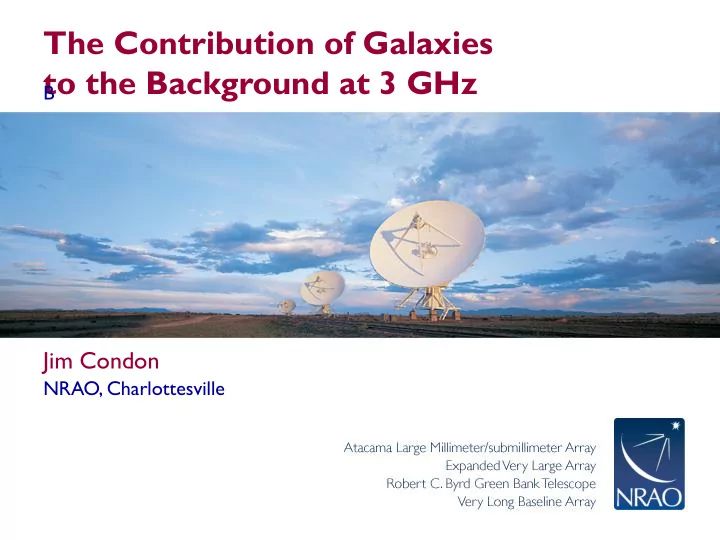

The Contribution of Galaxies to the Background at 3 GHz B Jim Condon NRAO, Charlottesville
The blind men and the elephant “Due to extreme delusion produced on account of a partial viewpoint, the immature deny one aspect and try to establish another. This is the maxim of the blind (men) and the elephant.” Radio Synchrotron Background Workshop 2017 July 19
Radio Synchrotron Background Workshop 2017 July 19
At 45 arcsec resolution, 1.4 GHz sources are mostly extragalactic, Galactic center Radio Synchrotron Background Workshop 2017 July 19
very isotropic, and hence very distant Radio Synchrotron Background Workshop 2017 July 19
very isotropic, and hence very distant 12 ○ ARCADE beam Radio Synchrotron Background Workshop 2017 July 19
T wo source populations dominate locally Two populations (AGNs and star forming galaxies) With no major “new population” (energy source or spectral index) since 3CR Radio Synchrotron Background Workshop 2017 July 19
Source counts and “simple” evolution 10 × luminosity evolution + S ∝ (1+z) -3.7 <z> ~ 0.8 shell, S ∝ L Radio Synchrotron Background Workshop 2017 July 19
Confusion-limited 3 GHz sky image, 8 arcsec resolution Radio Synchrotron Background Workshop 2017 July 19
Image noise A perfect Gaussian with nearly zero mean and rms σ n = 1.012 ± 0.007 μJy/beam after Δν Δτ ≈ 10 14 (1 μJy/beam = 2.1 mK) Radio Synchrotron Background Workshop 2017 July 19
Observed P(D) distribution and evolutionary models Radio Synchrotron Background Workshop 2017 July 19
Galaxy M82 Arp220 Radio Synchrotron Background Workshop 2017 July 19
Source counts and sky brightness model AGN starburst Radio Synchrotron Background Workshop 2017 July 19
Current data limit Source counts and sky brightnesses: linear ordinates Radio Synchrotron Background Workshop 2017 July 19
The radio and FIR backgrounds from star- forming galaxies Local FIR/radio correlation <q> = log(S 80 μ m )/log(S 1.4 GHz ) = 2.3 At z ~ 0.8, expect background q = log(S 160 μ m )/log(S 1.4 GHz ) = 2.5 COBE ν I ν ~ 1.3 × 10 -8 W m 2 sr -1 at λ = 160 μ m so I ν ~ 6.9 × 10 -21 W m 2 Hz -1 sr -1 ( ν = 1.88 × 10 12 Hz) Radio T = 37 mK at 1.4 GHz so I ν ~ 2.2 × 10 -23 W m 2 Hz -1 sr -1 Background q ~ log(6.9 × 10 -21 / 2.2 × 10 -23 ) ~ 2.5 Radio Synchrotron Background Workshop 2017 July 19
96% of the radio source background is resolved by S 1.4 GHz ~ 1.7 μJy Data points and box: 160 μ m Herschel counts converted to 1.4 GHz by the FIR/radio ratio q = log(S 160 μ m )/log(S 1.4 GHz ) = 2.5 Radio Synchrotron Background Workshop 2017 July 19
Gray scale: JVLA μJy/beam (3.02 GHz) Crosses: Owen & Morrison (2008) sources Radio Synchrotron Background Workshop 2017 July 19
59 02 30 8 arcsec 00 01 30 Declination (J2000) 00 00 30 00 58 59 30 10 46 10 05 00 45 55 50 Right Ascension (J2000) Grey scale flux range= -7.00 40.00 MicroJY/BEAM Radio Synchrotron Background Workshop 2017 July 19
ARCADE F IPOL ARCADEB.CROP.1 59 02 30 2.8 arcsec 00 01 30 Declination (J2000) 00 00 30 00 58 59 30 10 46 10 05 00 45 55 50 Right Ascension (J2000) Grey scale flux range= -7.00 40.00 MicroJY/BEAM Radio Synchrotron Background Workshop 2017 July 19 19
0.65 arcsec Radio Synchrotron Background Workshop 2017 July 19
The source sky is bumpy: rms confusion ~ 0.3 of background from stronger sources σ T = 2 mK @ 3 GHz σ T = 1 mK @ 3 GHz σ S ~ ν -0.7 σ T ~ ν -2.7 Example: θ = 8 arcsec FWHM at ν = 3 GHz so σ S ≈ 27 × 8 2 x (3/1.4) -0.7 nJy/beam ≈ 1.0 μ Jy/beam Radio Synchrotron Background Workshop 2017 July 19
Gaussian confusion and ARCADE 2: many more sources than galaxies? Radio Synchrotron Background Workshop 2017 July 19
What new discrete sources could produce the ARCADE 2 background? Radio Synchrotron Background Workshop 2017 July 19
Previous plot with linear ordinate Radio Synchrotron Background Workshop 2017 July 19
What new discrete sources could produce the ARCADE 2 background? Radio Synchrotron Background Workshop 2017 July 19
What can one blind man say about the elephant? Radio Synchrotron Background Workshop 2017 July 19
Radio Synchrotron Background Workshop 2017 July 19
Summary: 1) The JVLA has resolved about 96% of the radio background produced by AGNs (63 mK at 1.4 GHz) and by star-forming galaxies (37 mK at 1.4 GHz). 2) The radio background produced by star-forming galaxies agrees well with the COBE 160 μ m background and the FIR/radio correlation. 3) If the high ARCADE 2 background is real, it is too smooth to be produced by galaxies. If it consists of discrete sources, most are too faint to be detected individually even by the SKA. (Condon, Cotton, Fomalont, Kellermann, Miller, Perley, Scott, Vernstrom, & Wall 2012, ApJ, 758:23) Radio Synchrotron Background Workshop 2017 July 19
Largest beamwidth θ max for a given source detection limit Radio Synchrotron Background Workshop 2017 July 19
Radio Synchrotron Background Workshop 2017 July 19
No-noise P(D) distributions Radio Synchrotron Background Workshop 2017 July 19
Recommend
More recommend